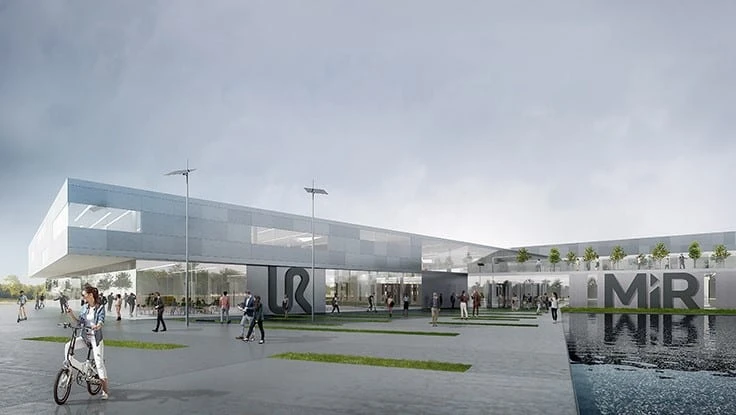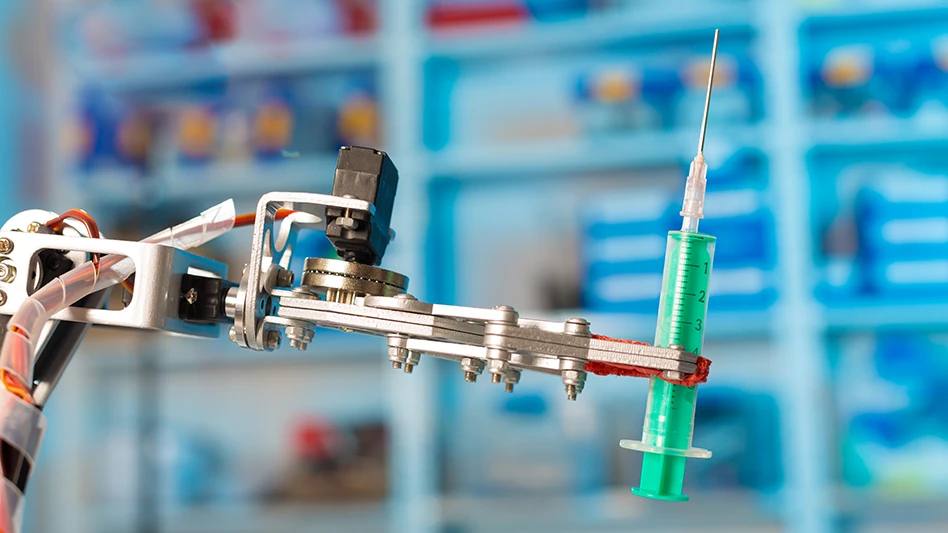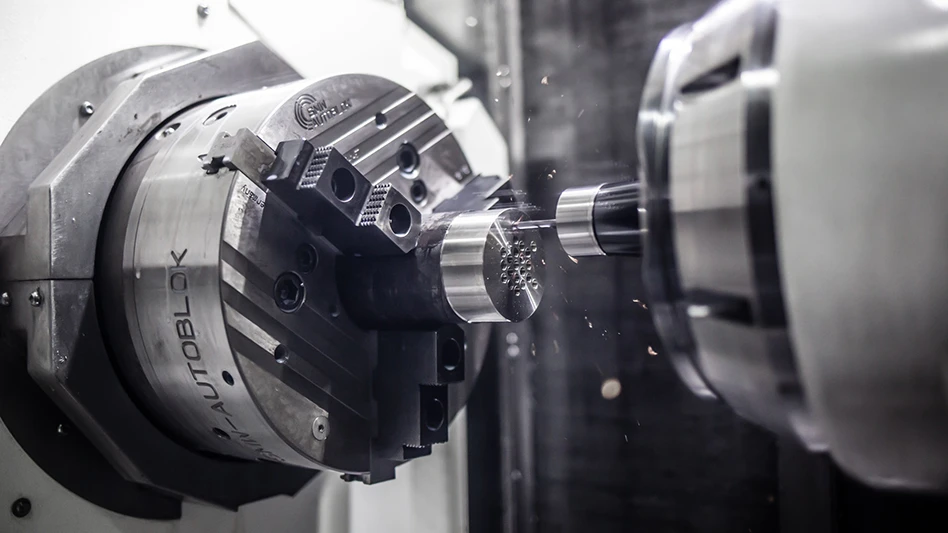
Mobile Industrial Robots (MiR) and Universal Robots (UR)
Since yesterday was Valentine’s Day I had a story up about Abbott’s Fully Implantable Left Ventricular Assist System that has earned FDA breakthrough device designation. Today, I’m serving up some cobot news from Universal Robots and Mobile Industrial Robots (MIR), covering a few new hires at America Makes, and wanted to let you know about Fastems’ Digital Manufacturing solutions that requires no physical automation system to simulate, educate, or introduce a factory automation system to employees.
Now, let's give a shout out to two other companies featured this weekend. First up is Xometry for going green and launching its carbon offset program to reduce the environmental impact of its shipped packages.
Kudos also go to Autocam Medical who presented nine students with certificates of completion for their CNC Machinist Apprentice Program during a January 16, 2020, ceremony at Western Michigan University’s AMP Lab in Grand Rapids. We need a trained workforce and these steps are what will support manufacturing today and in the future.
Happy reading and enjoy the weekend!
Mobile Industrial Robots, Universal Robots invest $36M in robot development and production
With financial backing from their joint U.S. parent company Teradyne, Mobile Industrial Robots (MiR) and Universal Robots (UR) have acquired a 50,000m2 building site in Odense, where $36 million will be invested in the construction of a major cobot hub. Collaborative robots – cobots – are now the fastest growing segment of industrial automation because they are a type of user-friendly robots that can work closely with humans without the need for safety guarding.
The new cobot hub supports Teradyne’s mission to further strengthen the significant leads that both MiR and UR have established worldwide.
“MiR and UR are leading the world in the collaborative robot revolution that’s making automation solutions available to companies of all sizes. Teradyne continues to invest aggressively in the development of new products, solutions, and sales channels and this new facility is a key part of our growth strategy,” says Mark Jagiela, president and CEO of Teradyne.
Expects further job growth
The building site is in Odense’s industrial district close to UR’s current headquarters, which will also become part of the new cobot hub. The two companies will continue as separate entities with the aim to create an attractive environment that will help attract new employees to facilitate the continued growth expected by the two companies in the coming years.
Danish robotics cluster on the rise
The Danish robotics industry is currently booming; the 2019 annual survey from trade association Odense Robotics shows that 8,500 people now work for Danish robotics companies, 3,900 of them in and around Odense, Denmark’s third largest city. If the industry follows the growth forecasts, the Danish robot industry will employ 25,000 employees in 2025 according to the Danish analyst firm Damvad.
And it’s not just the number of employees that’s growing. Danish robotics companies’ total revenue rose by 18% in 2018, reaching $995 million with exports increasing 26%. These figures are particularly significant in that just 15 years ago Denmark did not have any robotics industry to speak of.
Teach students, employees automation with Fastems Digital Manufacturing solutions
Fastems has launched three new products to enable educational institutions and manufacturing enterprises to benefit from its advanced Digital Manufacturing (DM) solutions for factory automation. In addition to functioning as a classroom teaching and learning tool, DM enables companies to do training and testing before ramp-up and simulation during production, for example.

Thanks to Fastems’ Digital Manufacturing solutions, no physical automation system is needed to simulate, educate, or introduce a factory automation system to clients, students, or employees.
According to Fastems Product Manager Janne Kivinen, “In addition to the benefits for educational institutes, DM brings great financial and productivity benefits to our industrial clients, making it possible to simulate the system effectively before hardware installation.”
For instance, a customer may want preparations to be done before the system is delivered, which saves time during ramp-up. Software and layout verification can be done in advance, and detailed simulation and visualization capabilities allow testing options before committing to a certain layout configuration. Employees can be trained in a safe and interactive environment so that training doesn’t disturb ongoing production. Further Fastems is developing new, innovative features to simulate and analyze alternative production scenarios to make smarter process decisions based on the results.
The new DM offering consists of three options: Virtual MMS (Manufacturing Management Software), Virtual FMS (Flexible Manufacturing System) and Virtual AMC (Agile Manufacturing Cell). Each of these solutions includes access to the software and 24/7 customer support. The Virtual FMS and AMC options include a Visual Components model, a 3D simulation software for manufacturing applications, including layout planning, production simulation, offline programming, and PLC verification, which functions as the manufacturing hardware of the system. All three products can be used as a local installation, and Virtual MMS can also be used as a cloud-based installation.
The DM concept is the first step towards developing a true Digital Twin for Fastems automation solutions, which will translate into better maintenance and production efficiency to the users of the system. In the future, Digital Twins will allow following the system, its parameters, and everything it interacts with for the entire lifecycle of the system, enabling better tools for production optimization, maintenance and intelligent manufacturing.
Xometry’s carbon offset program
Xometry announces the launch of a carbon offset program to reduce the environmental impact of its shipped packages. Partnering with Dot Neutral, each time a package is shipped from Xometry or a Xometry Manufacturing Partner, Xometry works with Dot Neutral to invest in a carbon emission offset initiative.
“Environmental sustainability is very important,” says Randy Altschuler, Xometry’s CEO. “As an industry leader and innovator, we need to help in the fight to slow climate change. Partnering with Dot Neutral allows Xometry to reduce our carbon footprint and hopefully will inspire other industry leaders and manufacturers to do the same. Xometry’s partner network approach also maximizes the utilization of existing manufacturing facilities. We will continue to find other ways to expand the impact of our efforts.”
Prior to launching the program, Xometry and Dot Neutral used the United States Environmental Protection Agency’s Greenhouse Gas Equivalencies Calculator to estimate the impact of the initiative. Over a 3 month period, Xometry’s program will offset 463,000 lb of carbon which is the energy equivalent of charging 26,031,439 smartphones.
Autocam Medical apprentices recognized at graduation ceremony
Autocam Medical presented nine students with certificates of completion for their CNC Machinist Apprentice Program during a January 16, 2020, ceremony at Western Michigan University’s AMP Lab in Grand Rapids.

The year-round program requires students to complete 728 hours of classroom instruction over a period of 91 weeks. Apprentices are also employed by Autocam Medical and must maintain a full work-schedule during the training period. In addition to CNC Machinist certification, the course of study also covers the necessary schooling required by the State of Michigan for students to receive a certified Journeyman card and puts them on the path to receive an associate’s degree, earning 27 college credits.
Four of the graduates also received their Journeyman card. The other five graduates are still working to complete the necessary hour requirements.
This is the second graduating class for Autocam Medical. Andy Beach, a 20-year industry veteran and Senior CNC machinist and Programmer, teaches the apprentice classes and a few other courses. “It is very rewarding to see students evolve into Journeyman machinists as they progress through the program and create finished products that are a culmination of their education,” said Beach.
As part of the program, students are challenged to machine two intricate objects. This year, the students machined a steam engine whistle, as well as a reversible game board featuring a Monopoly board and a chess board secured on a stand.
The apprenticeship is just one example of Autocam Medical’s commitment to creating a skilled workforce. They are also a key partner in the Advanced Manufacturing Partnership (AMP). The program is focused on encouraging and facilitating the development of students pursuing careers in engineering and manufacturing.
In addition to John C. Kennedy, President/CEO of Autocam Medical and John Kennedy, IV, General Manager of Autocam Medical, representatives from key AMP Lab partners, GRCC and WMU (Western Michigan University), also played a significant role in the event. Dr. Bill Pink, President of Grand Rapids Community College (GRCC), delivered a few words of motivation and inspiration. Faculty members from WMU and GRCC were also in attendance.
America Makes hires Operations Director and Communications & Public Affairs Director
Joining America Makes are Alexander Steeb as the new operations director and Andrew Resnick as the new communications & public affairs director.
These appointments will enable the Institute to continue advancing the adoption of additive manufacturing (AM) and supporting the Office of the Secretary of Defense (OSD) Manufacturing Technology (ManTech) program, which focuses on cross-cutting defense manufacturing needs.
“We are pleased to welcome Alexander and Andrew to the America Makes leadership team,” says America Makes Executive Director John Wilczynski. “Both Alexander and Andrew will share the same goal of continuing to grow America Makes as the recognized national thought leader in additive manufacturing through different, yet equally important, capacities.”
Latest from Today's Medical Developments
- Minalex celebrates 60 years of excellence in miniature aluminum extrusions
- Tormach’s Chip Conveyor Kit for the 1500MX CNC Mill
- #39 - Lunch & Learn Podcast with EMUGE-FRANKEN USA and Okuma America
- Significant expansion for Intricon
- REGO-FIX’s powRgrip toolholding system
- Birk Manufacturing achieves ISO 13485 recertification
- AdvaMed’s Medical Innovation Agenda for the 119th Congress
- SW North America's BA 322i twin-spindle CNC





